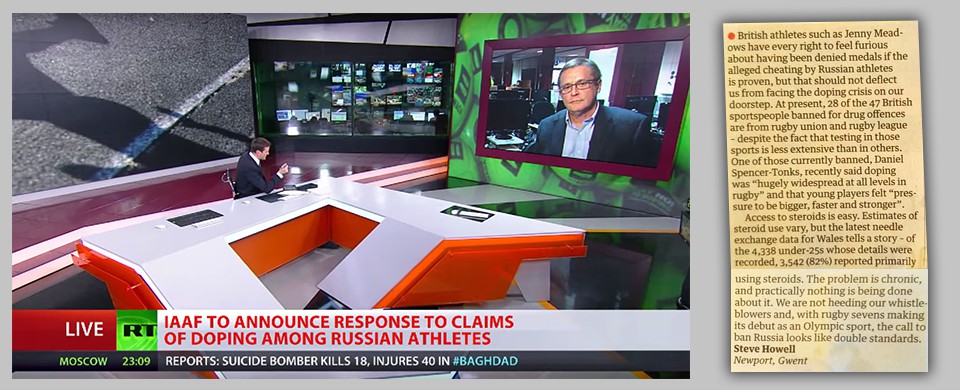It’s time to stamp out steroids on our doorstep
Sport in Britain needs to tackle the doping crisis on its doorstep, argued Over The Line author Steve Howell in the wake of the suspension of Russia from international athletics.
In a letter to The Guardian (see below) and in an interview with Russia Today, he said sportspeople have easy access to steroids through gyms across the UK where they are peddled mainly for image-enhancing body-building.
Earlier this year, Steve flagged his own and other people’s concerns about the extent of steroid use among young rugby players, saying “it was only a matter of time before (the) deadly long-term (health) consequences surface on a much larger scale”.
Of the 47 sportspeople currently serving bans for doping, 14 are from rugby union and 14 from rugby league, as compared with three from athletics and two from cycling.
“The higher numbers from rugby are not a sign of more testing,” he says. “They are, if anything, still understating the extent of the problem. The RFU, for example, introduced testing for academy players aged 17 and 18 in 2013-14 but that isn’t early enough because youngsters are being told to ‘bulk up’ by their coaches when they are 14 or 15.”
In September, former England Under-16 rugby union player Daniel Spencer-Tonks spoke out about the extent of the problem in rugby after testing positive for the steroid stanozolol and being banned for four years.
The 20-year-old, who was playing rugby league for the University of Gloucestershire All Golds at the time of his ban, told the BBC that steroids are “hugely widespread” in rugby and claimed “more people are taking it at the lower level because obviously there is testing at the higher level.”
He said: “There is a lot of pressure on players to be bigger, faster and stronger as they are the players who get picked.”
With rugby sevens making its debut as an Olympic sport next summer, Steve believes action is urgently needed.
“Not only do we risk being accused of hypocrisy, but we also owe it to teenagers coming into sport to protect them from doping and make them more aware of the health dangers.”
Steve’s letter to The Guardian:
British athletes such as Jenny Meadows have every right to feel furious they have been denied medals if the alleged cheating by Russian athletes is proven, but that should not deflect us from facing the doping crisis on our doorstep.
At present, 28 of the 47 British sportspeople banned for drug offences are from rugby union and rugby league – despite the fact that testing in those sports is less extensive than in others.
One of those currently banned, Daniel Spencer-Tonks, recently said doping is “hugely widespread at all levels in rugby” and young players feel “pressure to be bigger, faster and stronger”.
Access to steroids is easy. Up-and-coming teenagers in rugby go to the same gyms as their peers who are using steroids for image-enhancing reasons.
Estimates of steroid use vary, but the latest needle exchange data for Wales tells a story – of the 4,338 under 25s whose details were recorded, 3,542 (82%) reported primarily using steroids.
The problem is chronic, and practically nothing is being done about it. We are not heeding our whistle blowers and, with rugby sevens making its debut as an Olympic sport in Rio, the call to ban Russia looks very much like double standards.
Published: Saturday 14 November, 2015
Steve is the author of Over The Line, a novel telling the story of an Olympic poster girl embroiled in a drugs controversy.
Follow him on Twitter @fromstevehowell
Over The Line is available on Kindle (£3.49) via Amazon and in paperback (£7.99) at Waterstones and other bookshops or via this website (post free) – ORDER

